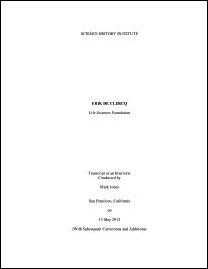Oral history interview with Fenyong Liu
- 2005-Nov-01 – 2005-Nov-03
Fenyong Liu was born and raised in Guangzhou, China during the Cultural Revolution. Early on in life he knew that he wanted to pursue science as his career, learning English during junior high school and having influential teachers while attending high school in Guangzhou. After passing the university entrance examinations, Liu matriculated at the prestigious University of Science and Technology of China. Initially he decided to pursue physics, but then transferred to the biology program after two years of study. Encouraged by his professors, Liu decided to attend graduate school in the United States at the University of Chicago, briefly spending time in the Medical School before transferring into the Biochemistry and Molecular Biology program, where he worked with Richard Roller and Bernard Roizman. While his initial research focused on the biochemistry of viral DNA replication, Liu focused in the last years of his doctoral study on the genetics of the herpes virus capsid protein; his research resulted in a patent and created intense interest from the pharmaceutical industry. He followed up his graduate research with postdoctoral positions at Bristol-Myers Squibb Pharmaceutical Research Institute and Yale University, where he worked with Sidney Altman on the inhibition of antiviral gene expression. Liu discusses his wife (also a scientist) and family as well as balancing family commitments and career, especially during the period when he became a principal investigator at University of California, Berkeley. His current research in molecular biology and virology has focused on cytomegalovirus infection; during the interview he describes his typical workday and both his laboratory management style as well as the multiple roles he plays as a principal investigator. The interview concludes with Liu's reflections on his various scientific mentors and on his wife's career trajectory and the difficulties of being a woman in science. Liu concludes his interview by reflecting on his various scientific mentors.
Access this interview
By request 1 PDF Transcript File and 12 Audio Recording Files
Fill out a brief form to receive immediate access to these files.
If you have any questions about transcripts, recordings, or usage permissions, contact the Center for Oral History at oralhistory@sciencehistory.org.









